By: Sveta Yamin-Pasternak, Department of Anthropology, University of Alaska Fairbanks and Igor Pasternak, Department of Art, University of Alaska Fairbanks
For nearly a quarter-century, much of our working life has revolved around our ethnographic research in the Bering Strait region of Alaska and Chukotka (Yamin-Pasternak and Pasternak 2021). Since Russia's invasion of Ukraine on 24 February 2022, our work in Chukotka has not been possible. The very real likelihood that we will not be able to return to a dozen or so of the Chukotkan villages and subsistence camps that over time have been our place of learning, family-like relationships, and often truly a home, is a big loss for us. Alas, this is not a loss that we dare to mourn when we think of the millions of ruined lives, including the enormous hardships that Russia's unprovoked invasion of Ukraine has forced on our loved ones (Yamin-Pasternak and Pasternak 2022–23). This is the position from which we candidly spoke as organizers of the session "Alaskan and Arctic Anthropology since Russia's Invasion of Ukraine," convened during the 50th annual meeting of the Alaska Anthropological Association (AkAA 2023) held in Anchorage, 1–4 March 2023.
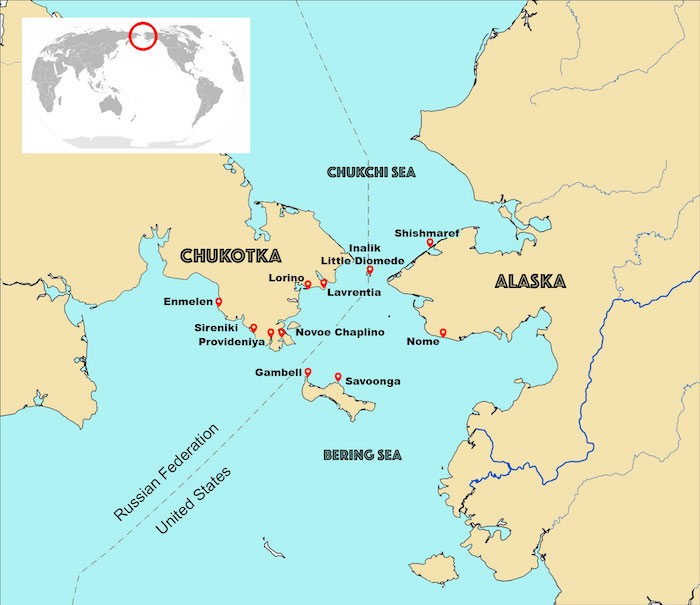
We believe this session was necessary because, in our observation, one year since the invasion, mass scale destruction, suffering, and displacement of millions of people, the Arctic research community continued to treat Russia's war in Ukraine as a subject of politics and mainstream news, with no direct relevance for Arctic social sciences (we gratefully cite the remarks by Oparin and Vaté, 2021, as an exception). For example, at the most recent Arctic Circle Assembly in Reykjavik, discussions focused on the implications of Russia's aggression for Arctic research and the work of the Arctic Council without discussing the implications of Russia's war in Ukraine for the rapidly changing human experience in the Circumpolar North.
An Overview of the Contemporary, Rapid, and Ongoing Societal Changes in Ukraine and in Chukotka
In Reykjavik and in Anchorage, not far from the sites of the conferences mentioned above, families of the recently arrived Ukrainian refugees have been settling into their new homes, organizing cultural events and making public art (Zubenko 2022). Some of them are joining their fellow ex-Soviet predecessors, adapting the horticulturalist way of life to expand the food base for the Northern locavores. Together, these new residents embody one of the many kinds of the transnational experience being created by the ever-growing migrant and diasporic populations in Alaska and the Arctic (Zagal and Edwin 2023, forthcoming).
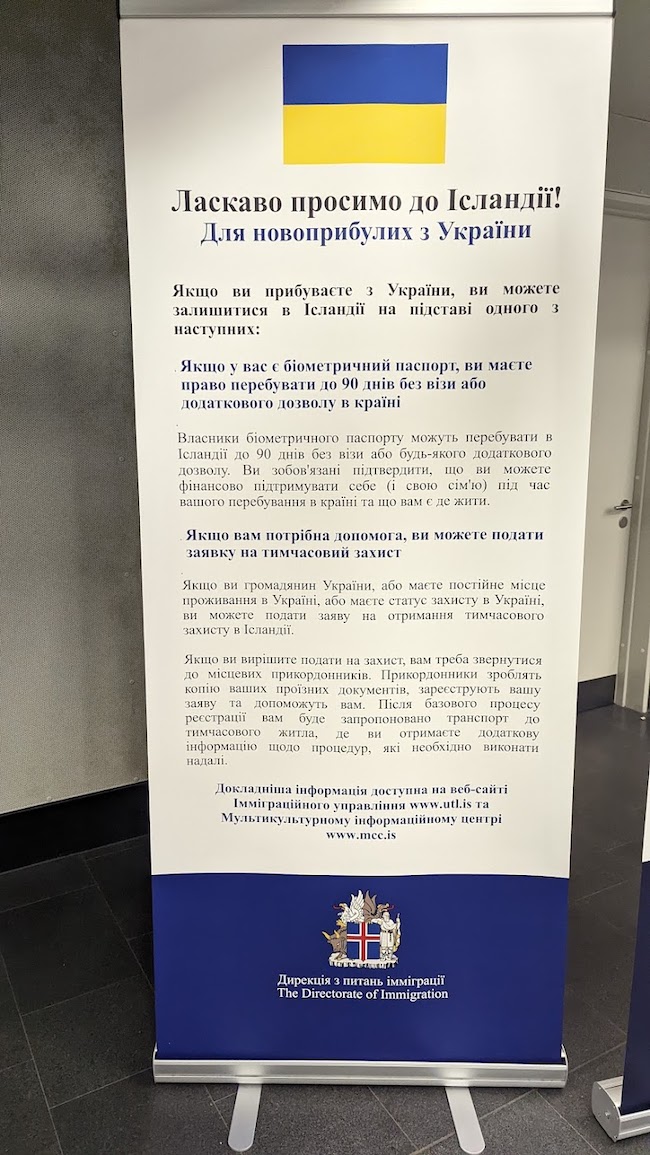
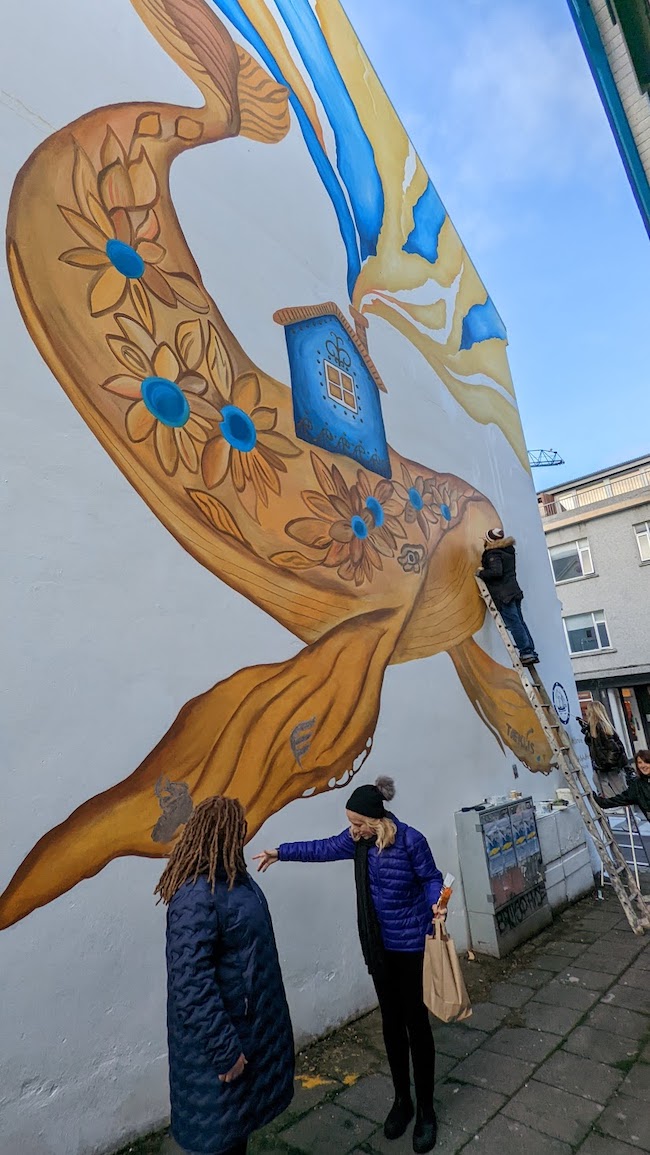
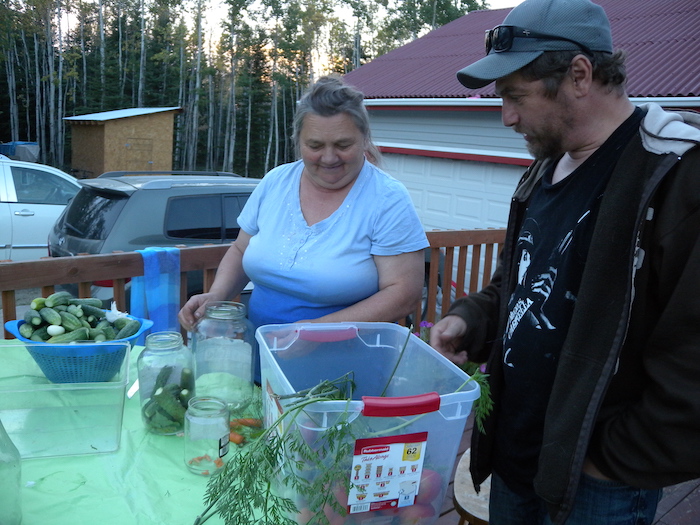
Meanwhile, members of the International Committee of Indigenous People of Russia speak of another kind of experience: that of being forced into an exile due to Russia's war and, more broadly, with the total war on dissent inside Russia (ICIPR 2022). Such exile from one's Native land is the firsthand experience for Elena Roik (2023), now an Anchorage-based scholar, who presented during our AkAA session on Russia's suffocation of human rights while reflecting on the empowerment of protest and collective action.
For many months now, Inuit across the Arctic, and especially Yupik and Inupiaq communities of the Bering Strait, have been mourning the deaths of their own among the mercenaries and soldiers fighting on behalf of Russia. At the most tragic crossings of our personal and professional lives, we spoke to the Bering Strait participants in the audience directly from the conference podium. We, Sveta and Igor, stand in solidarity with the Yupiget and Inupiat of the Bering Strait in our shared understanding that Russia's regime, through violence and war, brings devastating consequences for the Russian-citizen relatives of the Native people of Alaska.
The war and Putin's regime will eventually come to an end. However, a "turn of no return" (Yamin-Pasternak and Pasternak 2023), by which we refer to the future of the social science research in Russia, speaks not to a permanent separation from our sites of learning about cultures, languages, or traditional knowledge, but to the fact that hundreds of Indigenous hunters and reindeer herders—culture, language, and knowledge bearers—are gone. They are currently in the combat zones, minimally trained and poorly outfitted per numerous reports from the front, leaving entire villages without the workforce that plays an essential role in their communities' food security, economy, and culture (ICIPR 2023).
Issues and Lessons from Selected Presentations During the Session
Presentations by Indigenous scholars from Chukotka included their take on the perspectives of Chukotkan families, many of whom are proud to see their sons, brothers, husbands, and fathers going to fight (and die) in Ukraine. To help shed light on the information world inhabited by these families, Stacey Fritz (2023) presented an analysis of fabricated newscasts being aired on Russian television, and Igor Pasternak (2023) examined the visual discourse in Russia's propaganda art, as well as forms of artistic expression in and about Ukraine emerging since Russia's invasion. Dmitry Arzyutov and Victoria Peemot (2023) considered the role of state-controlled Indigenous organizations, including RAIPON (Russian Association of the Indigenous People of the North), which support the war, in the targeting of Indigenous men for the military draft; they also demonstrated how the identity of the Russian Defense Minister Sergei Shoigu—an Indigenous Tyva person—is being exploited for that purpose. Erica Hill, Arctic Social Sciences Program Director at NSF (2023), spoke on impacts the Russian invasion of Ukraine has on Arctic science, circumpolar collaborations, and future directions, while encouraging new engagements with the emerging social-cultural landscapes in the Arctic.
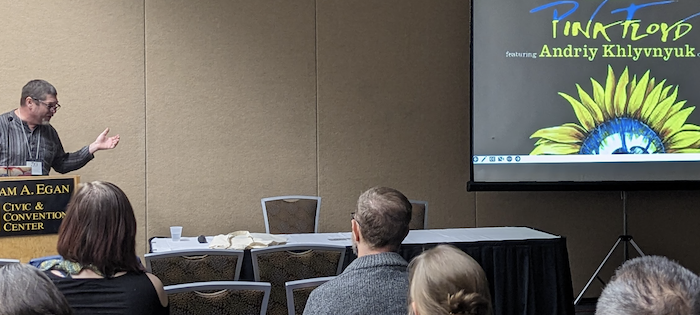
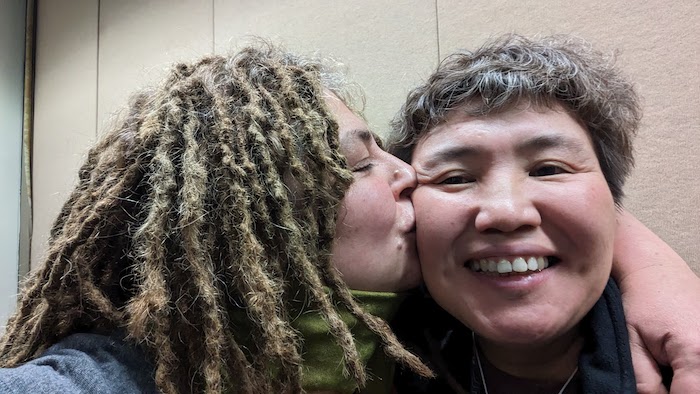
The session's impact was greatly enhanced by the comments from Anna Kerttula de Echave, past Arctic Social Sciences Program Director at NSF who, in the role of the discussant, reflected on her own experience as an anthropologist (Kerttula 2000) while encouraging comparative insight on experience of the Alaska Native veterans, further investigations of gendered relationships and understanding of masculinity in the contemporary Arctic contexts, and continued attention to the plight of the Ukrainian refugees and Russia's dissidents in exile. She was especially attentive to the lessons from the Siberianist network of Arctic social scientists who have been helping from day one to those who are affected by the humanitarian crisis that followed the invasion.
We, Sveta and Igor, also would like to take the opportunity to gratefully recognize our colleagues Stephan Dudek and Gerti Saxinger, in Germany and Austria respectively, who, like so many anthropologists living in Europe who are fluent in Russian thanks to their many years of research in Russian-speaking environments that include Siberia and Ukraine, have consistently stayed ahead of the international agencies to help bring people to safety and to deliver life-sustaining medicines and other critical supplies into Ukraine. Back in March 2022, when Sveta called Stephan and Gerti miracle workers for what they were able to do for our loved ones in Ukraine, Gerti responded: "No miracle, just empathy, some energy, and social ties. That's what we trained in, right?" Speaking as a session discussant and anthropologist, Anna Kerttula de Echave and several others agreed that these words truly capture the power of a social scientist in the largest sense. That is indeed the essence of our training. Let's keep putting it to good use.
Слава Україні!
Acknowledgements
We gratefully acknowledge all who contributed to the session and all those in/from Ukraine, Russia, and Alaska who helped us understand the importance of bringing the experiences highlighted by the presenters to the attention of the Arctic research community. Our own sense of connectedness to the topics discussed here emerged through lived experience and in the course of several research projects carried out over the last twenty years with the support of the National Science Foundation Arctic Social Sciences Program (Awards 1418443, 0329537, 0631321, 1151895, 2035404).
References
Arzyutov, D. and V. Peemot. 2023. Indigeneity "After" Shoigu: The Russian War in Ukraine and Siberian Indigenous Peoples, a presentation delivered at Annual Meeting of the Alaska Anthropological Association, Anchorage, Alaska, 1–4 March.
Fritz, S. 2023. Crimea of Ice: Russia's over the Pole Info Wars, Militarization, and the Role of Anthropology, a presentation delivered at the Annual Meeting of the Alaska Anthropological Association, Anchorage, Alaska, 1–4 March.
Hill, E. 2023. Impacts on Science of the Russian Invasion of Ukraine and Future Research Directions, a presentation delivered at the Annual Meeting of the Alaska Anthropological Association, Anchorage, Alaska, 1–4 March.
ICIPR (International Committee of the Indigenous People of Russia). 2023. The report by the International Committee of Indigenous Peoples of Russia (iCIPR) and the Anti-Discrimination Centre Memorial to the anniversary of the beginning of Russian aggression against Ukraine. Indigenous Russia. https://indigenous-russia.com/archives/30664, accessed 14 March 2023.
ICIPR (International Committee of the Indigenous People of Russia). 2022. Stop the War: Russian Indigenous People Speak out from Exile. Indigenous Russia. https://indigenous-russia.com/archives/19853.
Kerttula, A. 2000. Anter on the Sea: Yupik and Chukchi of the Russian Far East. Cornell University Press.
Oparin, D, and V. Vaté. 2021. Introduction. Etudes Inuit Studies 45 (1–2):49-50.
Pasternak, I. 2023. People Lie, but Art Doesn't: Looking to Visual and Oratory Art, Aesthetics, and Expressive Culture to Understand How Russia's Genocides at Home and in Ukraine are even Possible, a presentation delivered at the Annual Meeting of the Alaska Anthropological Association, Anchorage, Alaska, 1–4 March.
Roik, E. 2023. Devil's Apron and Other Reasons why Russia's Unprovoked Invasion of Ukraine has Made Me a Pomor in Exile, a presentation delivered at the Annual Meeting of the Alaska Anthropological Association, Anchorage, Alaska, 1–4 March.
Yamin-Pasternak, S. and I. Pasternak. 2023. Anthropology in Russia Since the Invasion of Ukraine: a "Turn" of No Return, a presentation delivered at the Annual Meeting of the Alaska Anthropological Association, Anchorage, Alaska, 1–4 March.
2022–2023. "Fremily in Alaska-Ukraine," Forum (Winter
Issue) https://issuu.com/alaskahumanitiesforum/docs/issuu_forum_winter_2022-23, accessed 14 March 2023.
- "Cooking and Commensality Along the Bering Food Bridge," Etudes Inuit Studies 45 (1–2):259–282.
Yurchak, A. 2005. Everything was Forever until It Was No More: The Last Soviet Generation. Princeton University Press.
Zagal, I. and C. Edwin. 2023. "Dia de Muertos in Alaska. Indigenous Practices Honoring Life and Death from Mexico to Alaska." Sibirica 22(1):143-158.
Zubenko, I., 2022. Ukrainians in Iceland Organize a Culture Festival. https://grapevine.is/news/2022/10/06/ukrainians-in-iceland-organise-a-c…, accessed 14 March 2023.
About the Authors
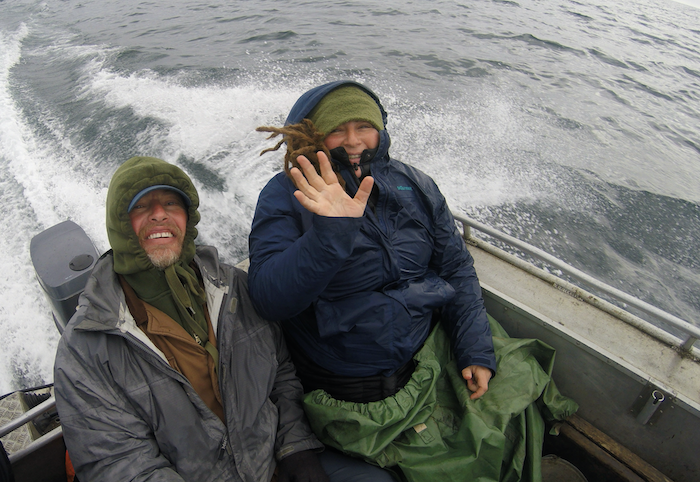
Igor Pasternak (left) is a broadly practicing artist and educator, specializing in participatory multimedia art and multidisciplinary synergies in humanities, engineering, and sciences. He is a lecturer and researcher at the University of Alaska Fairbanks with appointments in the Departments of Art and Anthropology, the Ethnobotany Program, and the Institute of Northern Engineering.
Sveta Yamin-Pasternak (right) is a cultural anthropologist studying food, aesthetics, and human-environmental relationships in communities around Alaska, Chukotka, and Igor's native Ukraine. She teaches in the University of Alaska Fairbanks Anthropology and Ethnobotany programs and leads several interdisciplinary research projects at the Institute of Northern Engineering.
